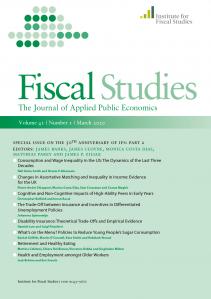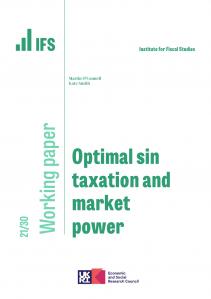
Regulating product characteristic space in food markets
Showing 1 - 12 of 13 results













21 May 2020

21 September 2021

Soft drink taxes have been implemented in 50 jurisdictions (as of August 2019). We review the evidence on their effects, summarising 27 studies of taxes in 11 jurisdictions.
24 September 2019

CEPR Discussion Paper DP12499
13 December 2017

Soda taxes aim to reduce excessive sugar consumption. Their effectiveness depends on whether they target individuals for whom the harm of consumption is largest. We estimate demand and account for supply-side equilibrium pass-through. We exploit longitudinal data to estimate individual preferences, which allows exible heterogeneity that we relate to a wide array of individual characteristics. We show that soda taxes are effective at targeting young consumers but not individuals with high total dietary sugar; they impose the highest monetary cost on poorer individuals, but are unlikely to be strongly regressive if we account for averted future costs from over consumption.
4 December 2017

The impact of variation in diet quality across individuals on obesity and diet-related disease has received much attention, but variation in individuals’ diet quality over time less so. This column combines British data on food purchases with a model in which individual choice is driven by the influence of a healthy self and an unhealthy self to examine self-control problems in food choice.
22 January 2018

IFS Senior Research Economist Kate Smith gives evidence at the Health Select Committeeand the Home Affairs Committee a which are holding a one-off oral evidence session to assess the case for introducing a minimum unit price (MUP) on alcohol in England in the light of developments since the Health C...
22 January 2018

Following a recent judgment, the UK Supreme Court confirmed that Scottish Government legislation for a minimum unit price for alcohol is lawful. The Scottish Government plans to introduce the measure on 1 May 2018. Meanwhile, the Welsh National Assembly is considering introducing a minimum unit price for alcohol. In this briefing note, we provide evidence on the likely impact of this type of reform.
15 December 2017

15 December 2017

Corrective taxes have been implemented in a number of countries with the aim of addressing growing concern about the rise in obesity- and diet-related diseases. The rationale is that food consumption imposes costs on the consumer in the future that they do not fully take into account at the point of consumption (‘internalities’). Corrective taxes have the potential to improve welfare by reducing suboptimally high consumption. We review the literature on the size of these internalities and on the optimal corrective tax, which depends on the patterns of internalities, the price responsiveness of consumers, and on redistributive aims.
20 November 2017

The exposure of households’ food spending to tariff changes and exchange rate movements
27 July 2017

How might Brexit affect food prices?
27 July 2017